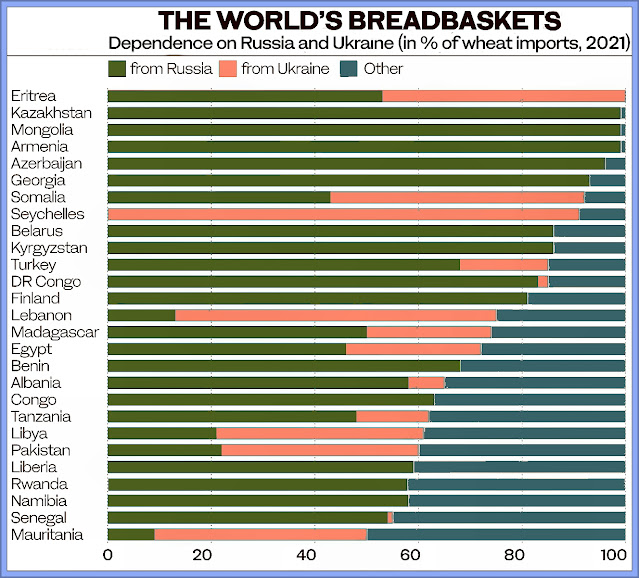Thirty per cent of the global export market of wheat in 2020 was by Russia and the Ukraine ...
 |
| Wheat Suppliers And Consumers |
... These markets were obviously going to be disrupted by both the Russian invasion of the Ukraine and the Western sanctions.
Russia, was the largest exporter of wheat in the world, and Ukraine, the fifth largest in the world.
 |
| Wheat Supply Dependence On Russia And The Ukraine |
A large number of countries (upwards of 50 countries), around the world depend on them for between 30 per cent and 60 per cent, of their wheat imports. On top of this, Russia and Ukraine also account for 75 per cent of global sunflower oil production. So the impact of both the sanctions on Russia, and the fighting in the Ukraine, are going to continue to impact the world supplies of those two commodities, especially in the third world.
During and in the immediate aftermath of the Covid pandemic, wheat prices had already risen an incredible 69 per cent, as part of the worldwide inflationary trend, but in the week before the war in the Ukraine started, wheat prices rose a further 55 per cent, driven by fears of shortages, and rising fuel costs adding to the cost of transporting it. Russia is also the world’s largest fertilizer exporter, with 15 percent of the world’s supply, and there are reports suggesting that it has asked its producers to halt fertilizer exports in retaliation for the sanctions imposed on it for invading the Ukraine.
Even if Russian fertilizers remain available, the financial sanctions imposed by the West on Russian companies, will make payments difficult for both exporters and importers alike, and likely lead to a freeze in the fertilizer trade markets. There are concerns that with less fertilizer available there will be less crop yields worldwide this year and next year, and thus not enough food to supply the demand, thus potentially pushing up food prices further.
The UN Secretary-General, António Guterres, has said that some 74 developing countries are particularly vulnerable to spiking costs for food, energy and fertilisers, and the Security Council member states must do what they can to protect people.
So there are real fears that wheat hoarding by producing countries, is going to pile yet more misery, on a third world that has already borne the brunt of vaccine inequality, and the subsequent recession .... The World Food Program (WFP), the UN agency that feeds the poor and hungry, was purchasing almost half of its global wheat supply from the Ukraine ... a supply that will likely be restricted or unavailable this year (and maybe for years to come), with massive implications for food aid programs in the poorest countries.
The WFP said that its expenditure has already increased by $71 million a month - which is enough to cut the daily rations for 3.8 million people. The head of the World Food Program, David Beasley has said “We will be taking food from the hungry, to give to the starving.”
When the Western world imposed sanctions on Russia, they are are also impacting the rest of the world and not just Russia. As an Afghan importer of cooking oil merchant said “The US thinks it has only sanctioned Russia and its banks. But the US has sanctioned the whole world.” .... Unaffordable food prices, especially that of bread, a staple for much of the world, are historically associated with riots, unrest, and attempts at regime changes in many of the poorer countries in the Middle East and North Africa, and even those where food poverty is not normally an issue.
The World Bank has said that Russia's invasion has caused more economic damage across Eastern Europe and parts of Asia, than the coronavirus pandemic, with the Ukrainian economy taking a 45.1% hit this year, and enormous damage to it's infrastructure, that will take at least two decades to repair. Russia's economy has already been plunged into a deep recession as a result of sanctions from Western countries.
The World Bank has also predicted that in addition to the existing damage inflicted to both the Russian and Ukrainian economies, Belarus, the Kyrgyz Republic, Moldova and Tajikistan were projected to fall into recession this year (as well as Western countries, including sadly, the UK).
So we may well see some other unintended consequences across the globe, if the already unprecedented rise in food costs are also compounded by actual physical shortages. Hunger drives protests, and famine drives both revolutions and mass people migrations .... the consequences of this war will be with us for years to come.

No comments:
Post a Comment
All comments are welcomed, or even just thanks if you enjoyed the post. But please make any comment relevant to the post it appears under. Off topic comments will be blocked or removed.
Moderation is on for older posts to stop spamming and comments that are off topic or inappropriate from being posted .... comments are reviewed within 48 hours. I don't block normal comments that are on topic and not inappropriate. Vexatious comments that may cause upset to other commentators, or that are attempting to espouse a particular wider political view, are reviewed before acceptance. But a certain amount of debate around a post topic is accepted, as long as it remains generally on topic and is not an attempt to become sounding board for some other cause.
Final decision on all comments is held by the blog author and is final.
Comments are always monitored for bad or abusive language, and or illegal statements i.e. overtly racist or sexist content. Spam is not tolerated and is removed.
Commentaires ne sont surveillés que pour le mauvais ou abusif langue ou déclarations illégales ie contenu ouvertement raciste ou sexiste. Spam ne est pas toléré et est éliminé.